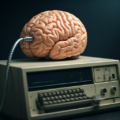It turns out your brain does not care if a language is thousands of years old or freshly invented for a TV show. If it carries meaning about the world and the speaker’s thoughts, the brain’s language network treats it... View Article
Categories for Uncategorized
Your brain gets a mental boost from exercise that can last until tomorrow
February 14, 2025 11:00 amWe all know that moving our bodies is good for our hearts, muscles, and joints. Science is also showing that it gives our brains a lift, not just over the long term but even in the hours right after we... View Article
When we think of memory, we think of neurons. These wiry brain cells fire in complex circuits to help us recall names, faces, and where we left our keys. But a new study challenges that assumption. Researchers have discovered that... View Article
Think about your most vivid memory. Maybe it’s a childhood birthday, your first day at a new job, or an emotional moment. Why did that particular event stay with you while countless others vanished? According to a new review by... View Article
Modern work culture often glorifies grinding through mental blocks: the longer you sit and concentrate, the more productive you must be… right? Not quite. According to neuroscience research (and the habits of some of the world’s most innovative minds), walking... View Article
Centuries ago, legends claimed that a child might be forced to witness a major event and then be tossed into a river so they would never forget it. The hypothetical method was brutal, but the reasoning behind it carries a... View Article
As we grow older, it’s natural to notice a slowdown in mental sharpness. But did you know that your brain’s “age” can be quite different from the number on your birth certificate? New research shows that with just a small... View Article
If you’ve ever pulled an all-nighter and then found yourself struggling to focus or mixing things up, you’re not alone. You might be experiencing what scientists call attentional blink. A recent study explored what happens when you go a full... View Article
When we think about sleep, most of us imagine our brains quietly filing away the day’s memories. But new research suggests something more intriguing may be happening: your brain could be planning for the future. A team of scientists at... View Article
When most of us think of memory, we imagine a tidy mental archive where every moment of our lives is stored for future reference. Neuroscientist Charan Ranganath says that could not be further from the truth. In his book Why... View Article
If you have ever studied a new language and suddenly found yourself blanking on a word in another language you already knew, you are not imagining things. New research from the Netherlands suggests that picking up vocabulary in one language... View Article
In an unprecedented move, four major Canadian school boards are holding some of the world’s largest social media companies accountable for the impact their platforms have on students. The boards, including Toronto District School Board, Peel District School Board, Toronto... View Article
How did you check your schedule this morning? In a world dominated by digital tools, the most popular answer would be using a digital calendar. Typing on our phones and laptops, or even using voice assistants has become the norm... View Article
Have you ever wondered how your brain weaves fleeting moments into cohesive memories? A groundbreaking study from the Kavli Institute for Systems Neuroscience in Norway sheds light on this remarkable process. The research team, led by Professors Edvard and May-Britt... View Article
As teachers face limited opportunities for creativity, it’s worth re-evaluating how the education system can best support innovation. Schools have often prioritized standardized testing and structured processes to maintain consistency, but this can sometimes restrict teachers from designing curricula tailored... View Article
When you’re trying to remember the name of that actor from that movie, your brain might be behaving more like a hungry squirrel than you think. New research suggests that the mental forage for words and ideas follows surprisingly similar... View Article
It’s evident that how we breathe can affect how we feel – we tend to calm down when we focus on deep breaths and become more anxious when taking shallow ones. However, new research shows that breathing may also play... View Article
With so many new-age digital tools, we often rely on our phone’s camera roll storage to hold our memories and ideas. However, relying too heavily on devices can make our brains sluggish. Luckily, we have our own storage system lying... View Article
Have you ever noticed how hard it is to sit with a book or even a quiet thought without reaching for your phone? For many young people, this challenge is more than occasional distraction. It is becoming a full-blown crisis... View Article
ChatGPT-4 – the computer interface you can interact with – just got even better. The AI chatbot uses natural language processing to create humanlike conversational dialogue and can compose written content in various modes, including essays, social media posts, emails,... View Article



















